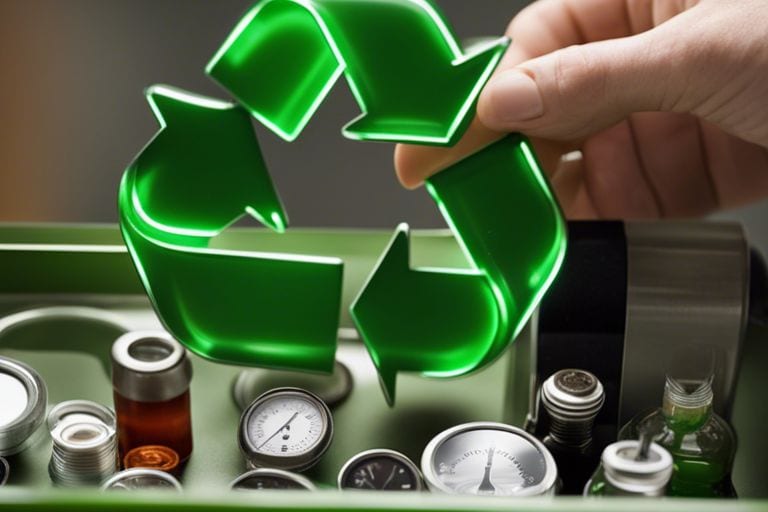Over the years, mercury-containing devices such as thermostats, fluorescent bulbs, and medical devices have become a concern due to the harmful effects of mercury on both human health and the environment. Safely recycling these devices is crucial to prevent mercury pollution. One effective way to ensure the safe disposal and recycling of mercury-containing devices is through EPR Registration for Electronic Waste Management Process. By participating in this program, individuals and organizations can contribute to sustainable waste management practices and protect our planet from the dangers of mercury contamination.
Key Takeaways:
- Mercury-containing devices such as fluorescent light bulbs, thermometers, and thermostats must be safely recycled to prevent environmental contamination.
- It is necessary to find a recycling facility with EPR registration for mercury-containing devices to ensure proper handling and disposal according to regulations.
- Proper recycling of mercury-containing devices not only protects the environment but also reduces the risk of mercury exposure to individuals and communities.
Identifying Mercury-Containing Devices
Assuming you are looking to recycle mercury-containing devices responsibly, it is crucial to first be able to identify them accurately. This knowledge is necessary to prevent mercury exposure and ensure proper disposal of these hazardous materials.
Common Types of Mercury-Containing Devices
As far as mercury-containing devices, there are several common types that you may encounter in your household or workplace. These include thermometers, thermostats, fluorescent tubes, and switches. Each of these devices has the potential to release mercury into the environment if not handled properly.
- Thermometers
- Thermostats
- Fluorescent tubes
- Switches
Knowing how to recognize these mercury-containing devices is crucial for your safety and the environment's well-being. By being aware of their characteristics and where they are commonly found, you can take the necessary precautions when handling or disposing of them.
Factors to Consider When Identifying Devices
An important aspect to consider when identifying mercury-containing devices is their physical appearance. Some devices may have a silver liquid inside, while others may have a label indicating the presence of mercury. Additionally, the age of the device can also be a factor, as older devices are more likely to contain mercury.
- Physical appearance
- Presence of labels
- Age of the device
The proper identification of mercury-containing devices is crucial for preventing mercury pollution and protecting human health. By being vigilant and informed about these devices, you can ensure that they are handled and recycled responsibly, minimizing the risks associated with mercury exposure.
Preparing for Safe Recycling
How-to Segregate Your Devices
Some Mercury-containing devices need to be segregated before sending them for recycling. This is necessary to ensure that the mercury is properly handled and does not pose a risk to the environment or human health. Make sure to separate devices such as thermometers, thermostats, fluorescent lamps, and button cell batteries from other waste materials.
Tips for Safe Handling and Packaging
There's no denying the importance of safe handling and packaging when dealing with mercury-containing devices. To minimize the risk of mercury exposure, wear gloves and a mask when handling these devices. Place the devices in sealed bags or containers to prevent mercury from leaking out.
- Wear protective gear such as gloves and masks
- Seal devices in bags or containers
- Label containers as containing mercury
An additional precaution to take is to label the containers as containing mercury for the safety of those handling them after collection.
Navigating EPR Registration
Your Storing, Transporting and Disposing of Mercury | US EPA is crucial for the safe handling of mercury-containing devices. In the context of Extended Producer Responsibility (EPR) registration, there are specific steps and requirements that must be followed to ensure compliance and environmental responsibility.
Steps for EPR Registration
Navigating the EPR registration process involves several key steps. First, you must gather all necessary information about your business and the mercury-containing devices you produce or sell. Next, you will need to identify the appropriate regulatory agency responsible for EPR registration in your region.
Documentation and Compliance Requirements
To comply with EPR registration, you will need to submit detailed documentation outlining your business activities, the types and quantities of mercury-containing devices you handle, and your plans for managing and recycling them. You must also demonstrate compliance with all relevant environmental regulations and standards.
Compliance with documentation and compliance requirements is vital for maintaining environmental integrity and safeguarding public health. Failure to meet these obligations can result in fines, penalties, and damage to your reputation as a responsible producer or seller of mercury-containing devices.

Engaging with Certified Recyclers
After reading the Report Extended Producer Responsibility, it is crucial for businesses to engage with certified recyclers for the safe disposal of mercury-containing devices. Certified recyclers adhere to strict regulations and guidelines to ensure proper handling and recycling of hazardous materials.
How to Choose the Right Recycling Partner
Little research goes a long way when selecting a recycling partner for mercury-containing devices. Look for recyclers with certifications such as R2 (Responsible Recycling) and e-Stewards to guarantee responsible and environmentally friendly practices. Additionally, consider the recycler's experience, facilities, and track record in handling mercury-containing devices.
Coordination and Logistics for Recycling
Recycling coordination and logistics play a crucial role in ensuring a smooth and efficient recycling process for mercury-containing devices. Work closely with the chosen recycler to establish clear communication channels, schedules for pickups, and proper packaging guidelines. Strong coordination helps prevent any mishandling or accidents during transportation and processing.
How to manage the transportation, storage, and processing of mercury-containing devices is necessary for a successful recycling program. Improper handling of these devices can lead to mercury leakage, posing serious health and environmental risks. It is vital to work with experienced recyclers who have the expertise and resources to handle mercury-containing devices safely and effectively.
Understanding the Recycling Process
Despite the potential dangers associated with mercury-containing devices, proper recycling can help mitigate environmental and health risks. Understanding the recycling process is crucial in ensuring that mercury devices are safely managed and reused to prevent harmful exposure.
Factors Affecting the Recycling of Mercury Devices
Several factors can influence the successful recycling of mercury-containing devices, including:
- Collection Infrastructure: The availability of convenient collection points for mercury devices can significantly impact recycling rates.
- Regulatory Support: Stringent regulations and enforcement mechanisms play a vital role in ensuring the proper handling and recycling of mercury-containing devices.
- Consumer Awareness: Educating the public about the dangers of mercury and the importance of recycling can boost participation in recycling programs.
Knowing these factors can help stakeholders develop effective strategies for promoting mercury device recycling and reducing environmental contamination.
Tips for Ensuring Comprehensive Recycling
To ensure comprehensive recycling of mercury-containing devices, consider the following tips:
- Find Authorized Recyclers: Look for certified recyclers with expertise in handling mercury devices to guarantee safe and environmentally responsible recycling.
- Proper Packaging: Ensure that mercury devices are securely packaged to prevent leaks or breakages during transportation.
- EPR Registration: Registering as an Extended Producer Responsibility (EPR) participant can help ensure compliance with recycling regulations and support the proper management of mercury-containing devices.
After following these tips, you can contribute to a more sustainable and safer recycling process for mercury devices.
Affecting: Ensuring the proper recycling of mercury-containing devices can protect the environment, safeguard public health, and conserve non-renewable resources effectively.
Promoting Responsible Recycling Practices
All manufacturers, retailers, and consumers have a role to play in promoting responsible recycling practices for mercury-containing devices. By following proper disposal methods, we can protect the environment and human health from the harmful effects of mercury exposure.
How-to Foster Community Awareness
Howto educate the public about the importance of recycling mercury-containing devices through community awareness campaigns and educational programs. By partnering with local governments, schools, and community organizations, we can raise awareness about the proper disposal methods and the risks associated with improper handling of mercury-containing devices.
Furthermore, organizing recycling drives and collection events can encourage individuals to properly dispose of their old devices. By providing convenient and accessible opportunities for recycling, we can reduce the amount of mercury entering the environment and prevent potential health hazards.
Building Corporate Responsibility Programs
Corporate entities play a crucial role in promoting responsible recycling practices through the implementation of environmental stewardship initiatives. By incorporating recycling goals into their sustainability strategies, companies can lead by example and inspire others to follow suit.
Responsible organizations also have the opportunity to collaborate with recycling facilities and advocacy groups to support the development of efficient recycling infrastructures. By investing in these programs, companies can contribute to a healthier environment and demonstrate their commitment to sustainable practices.
Summing up
Considering all points discussed, it is evident that safely recycling mercury-containing devices is crucial to protect human health and the environment. Through EPR registration, proper handling, and recycling facilities, we can mitigate the negative impacts of mercury pollution and prevent its harmful effects. By following the recommended guidelines and utilizing designated programs, we can ensure the safe disposal and recycling of these devices, contributing to a cleaner and healthier tomorrow for all.
FAQ
Q: What are Mercury-Containing Devices?
A: Mercury-containing devices are products that contain elemental mercury, such as thermometers, thermostats, fluorescent lamps, and certain medical devices.
Q: Why is it important to recycle Mercury-Containing Devices?
A: Recycling mercury-containing devices is crucial because it prevents mercury pollution in the environment, reduces the risk of mercury exposure to humans and wildlife, and conserves valuable resources.
Q: What is EPR Registration in relation to Mercury-Containing Devices recycling?
A: Extended Producer Responsibility (EPR) Registration is a regulatory approach that makes producers responsible for the end-of-life management of their products, including the recycling of mercury-containing devices.
Q: How can I safely recycle Mercury-Containing Devices?
A: You can safely recycle mercury-containing devices by contacting an authorized recycling facility that handles hazardous materials and follows proper disposal procedures to ensure the safe handling of mercury.
Q: Where can I find more information about recycling Mercury-Containing Devices with EPR Registration?
A: You can find more information about recycling mercury-containing devices with EPR Registration by visiting the official website of your local environmental agency or contacting them directly for guidance on proper disposal methods and recycling options available in your area.
